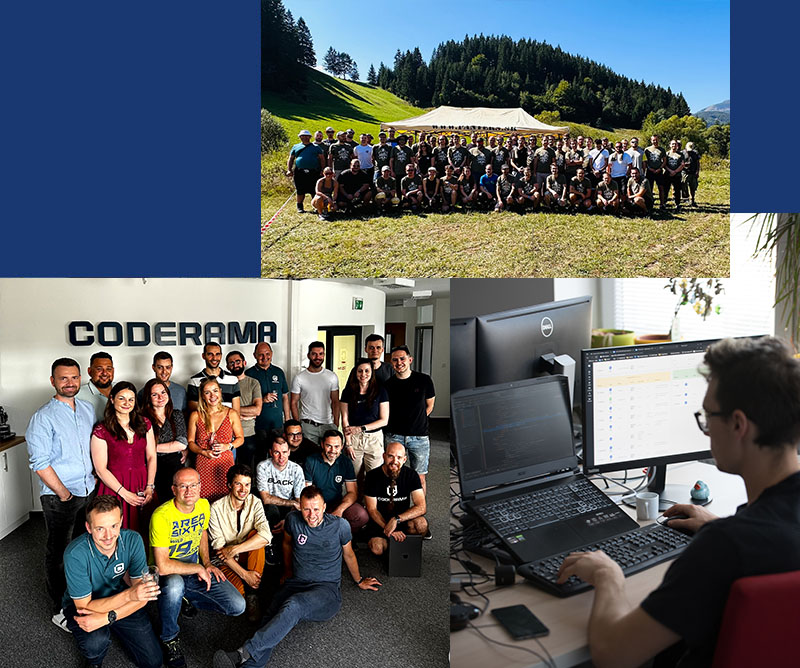Programming language is not everything. What level of English is required in IT?
Alexandra Vaszily|28.03.2023
Do you work or want to work in the IT sector and do your best to have to have the main programming languages at your fingertips? Great, you are doing well! Do not forget, though, that nowadays you cannot do without international language skills, especially English.

Do you work or want to work in the IT sector and do your best to have to have the main programming languages at your fingertips? Great, you are doing well! Do not forget, though, that nowadays you cannot do without international language skills, especially English.
“Do you speak English?”
Expert skills in English are still rare in Slovak companies and the majority of people, except managers, can get by with just a basic knowledge of English. However, the IT sector is a bit of an exception. Most programming languages use English, so, simply put, you cannot write any code without it.
Many companies which fill IT positions also operate on the international market, have international clients and often employ people of various nationalities. Communication is solely in English and, therefore, an intermediate to expert level of English is required, i.e., B2, C1 and even C2.
The specific level and focus of English depend on the job position and its content. The work of a software developer in a small Slovak company requires different knowledge to the work of a helpdesk operator in an international company.
However, general English is not enough in the IT sector, but technical language is needed. So, it is necessary to have a good command of professional terminologies. The main language areas that an IT employee should master are, for example, mobile technologies and applications, software solutions, networks and their management, data centres or information security.
What about Coderama?
Developers in Coderama use English on a daily basis. Almost half of our developers work in international teams and most of the programming languages our colleagues work with require, at least, a B2 level.
We have 3 rounds in a job interview that candidates must pass:
- The first round is a general informal interview with our HR managers where information about previous work experience is gathered. There is also at the beginning a 5-minute interview that is done in English to show if the candidate can speak on a communicative level.
- In the next round a technical test is taken, where English is required since most programming terms are in English.
- The last round that candidates must pass is a technical interview. This is where they meet colleagues within the project as well as the project manager. These conversations are often times conducted entirely in English and are selected according to the end client. With more than 50 projects, our developers almost always come across English.
Coderama offers an educational benefit of 250 € that allows our developers and employees to order language or technical courses, thus improving their knowledge and skills.
How to improve your English?
Have you managed thus far with just basic English, but you are looking for a job that requires a higher level? Or have you got an international client with whom you must regularly conduct meetings in English? Or maybe you just want to do something for your personal growth? Do not despair. There are many ways to improve your IT language skills:
Specialised courses
It has never been easier to learn a foreign language. Actually, nowadays, there are several specialised language courses directly oriented to the needs of the IT sector. However, they are designed for telecommunication and information technologies so their focus may be more extensive. Most of them are online. What more can you ask for?
By means of them, you will be able to improve in technical English, build your vocabulary and terminologies, learn to better communicate as well as explain various processes and functions of software, applications or devices. Furthermore, you will gain confidence and courage in solving work issues and communicating with colleagues and clients in English. Some examples of courses: fluentbe.com, viveus.sk, skolenia.sk or onlinejazyky.cz.
Stays abroad
Many companies have their branch offices or partners abroad, thus allowing various work stays and internships. Where else can you improve in a foreign language than outside Slovakia and your comfort zone? Do not hesitate to ask your HR department and find out what possibilities you have. You might be surprised where your work can take you. At the same time, you will get to know foreign cities, gain new contacts and prove that you are motivated to move up in your career. If you are a student, you should definitely take advantage of internships abroad. Your playing field is endless!
Coderama has a foreign branch only in Prague. Nevertheless, we still offer many interesting career opportunities.
Employee benefit
If you are an employee, to begin with, try to contact your employer and find out if they offer or reimburse English courses as part of company benefits. It has now become the standard in most medium and large companies that have over 50 employees. Companies value the IT skills of their people and have no problem investing money in them so that they can improve also in languages. Thus, IT skills usually weigh more than language skills, which are easier to catch up with.
As you can see, a poor knowledge of English for IT professionals is not a problem at all. Just do not be shy, check your real level and do something to improve it. Fingers crossed! :)

